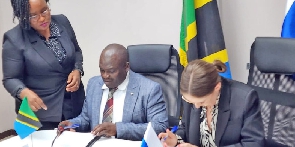Tanzania and Russia have made three improvements on the current Bilateral Air Services Agreement (Basa) to expand the air transport network and boost tourism and trade between the two nations, the Tanzania Civil Aviation Authority (TCAA) announced over the weekend.
The regulator said in a statement that the changes which were made by experts from the two countries who met in Moscow, Russia last week, include increasing the points of entry for the designated airlines of Tanzania in Russia from one to three.
They also agreed to include provisions on code sharing in the new Basa as well as the need for modern airlines to extend freedoms beyond the traditional third and fourth to optimise yields.“The collaborative efforts of the expert teams from Tanzania and Russia will set a stage for fostering increased connectivity and opportunities for the aviation industry's growth in the post-pandemic world,” reads a part of the TCAA’s statement.
Under the new pact, the designated airlines of Tanzania will now have three entry points in Russia: Moscow, St. Petersburg and Yekaterinburg.
The current Basa of 1978, which has been overtaken by events including the Covid-19 outbreak, has Moscow only.
For the designated airlines of Russia, Zanzibar and Kilimanjaro have been added to Dar, the only agreed upon entry points in Tanzania in the current Basa.
The statement further stated that inclusion of code sharing provisions in the new Basa is critical in today's business strategies by airlines.
“Code sharing is vital for maximising airline yields, and its absence in the current Basa has been addressed to facilitate better business strategies for the airlines,” reads a part of the statement.
On the question of exercise of fifth freedom traffic rights by airlines, it was agreed by both parties that airlines today need to extend freedoms from the traditional third and fourth freedom traffic rights so as to maximise yields.
Under the new agreement, designated airlines from both countries may fly to a third country with this traffic right, subject to mutual agreement by the aeronautical authorities.
As a result of the successful negotiations, a Memorandum of Understanding (MoU) was signed by the Heads of delegation from both parties.
The final signing of the Basa will occur once the necessary institutional procedures of both governments have been completed.
Air Tanzania Company Limited (ATCL) managing director Ladislaus Matindi told The Citizen on Saturday that the review of the current Basa could provide room for more business opportunities.
“We have already made an analysis on the Russian market. We are currently looking at the business trend before making a decision to start flying to that destination,” asserted Mr Matindi.
He went on to add: “I am optimistic that in the future Russia will be one of the significant markets.”
Efforts to get comments from Precision Air proved futile.
Kilimanjaro Airports Development Company (Kadco) managing director Christine Mwakatobe said the review of the current Basa will attract airlines from both parties to start scheduled flights.
“Following good ties between Tanzania and Russia there has been a large movement of people to and from Russia. This is an opportunity that airlines need to capitalise on,” Ms Mwakatobe told The Citizen on Saturday.
Russian tourists visiting Tanzania continue to rise, with many choosing Zanzibar Island for its beaches and then continuing their itineraries to Nyerere National Park for wildlife drives.
In 2021 Russian tourists were the most popular foreign visitors to Tanzania, with the East African nation welcoming about 85,000 Russian tourists, according to official data.
Tanzania was one of the few nations that allowed Russians to visit despite the Covid-19 outbreak.
However despite growth potential, official data show that trade volume between the two brotherly countries is not that promising and thus calling for more efforts to boost the figure.
As of August last year trade volume between the duo stood at around $200 million (about Sh480 billion).
The review of Basa came amidst the ongoing recovery of air transport services from the severe impact of the Covid-19 pandemic as significant progress has been made to foster the transformation of the aviation industry.
TCAA data show that cargo handled last year surpassed the pre-pandemic levels by 32 percent to reach 35,130.83 tonnes.
On the other hand, passengers carried by airlines increased by almost two percent to hit 5.723 million.
When it comes to aircraft movement, they still remained below pre-pandemic level by just 15.4 percent.
The review of the Basa between Tanzania and Russia suggests that the performance of the aviation sector could be even more promising.
The Tanzanian delegation to Russia, which was led by Mr Biseko Chiganga from the Ministry of Works and Transport, was composed of experts from TCAA and the Ministry of Foreign Affairs and East African Cooperation.
Others were from the Office of the Attorney General, ATCL, Precision Air, Kadco and Zanzibar Airports Authority.
Africa News of Monday, 31 July 2023
Source: thecitizen.co.tz













